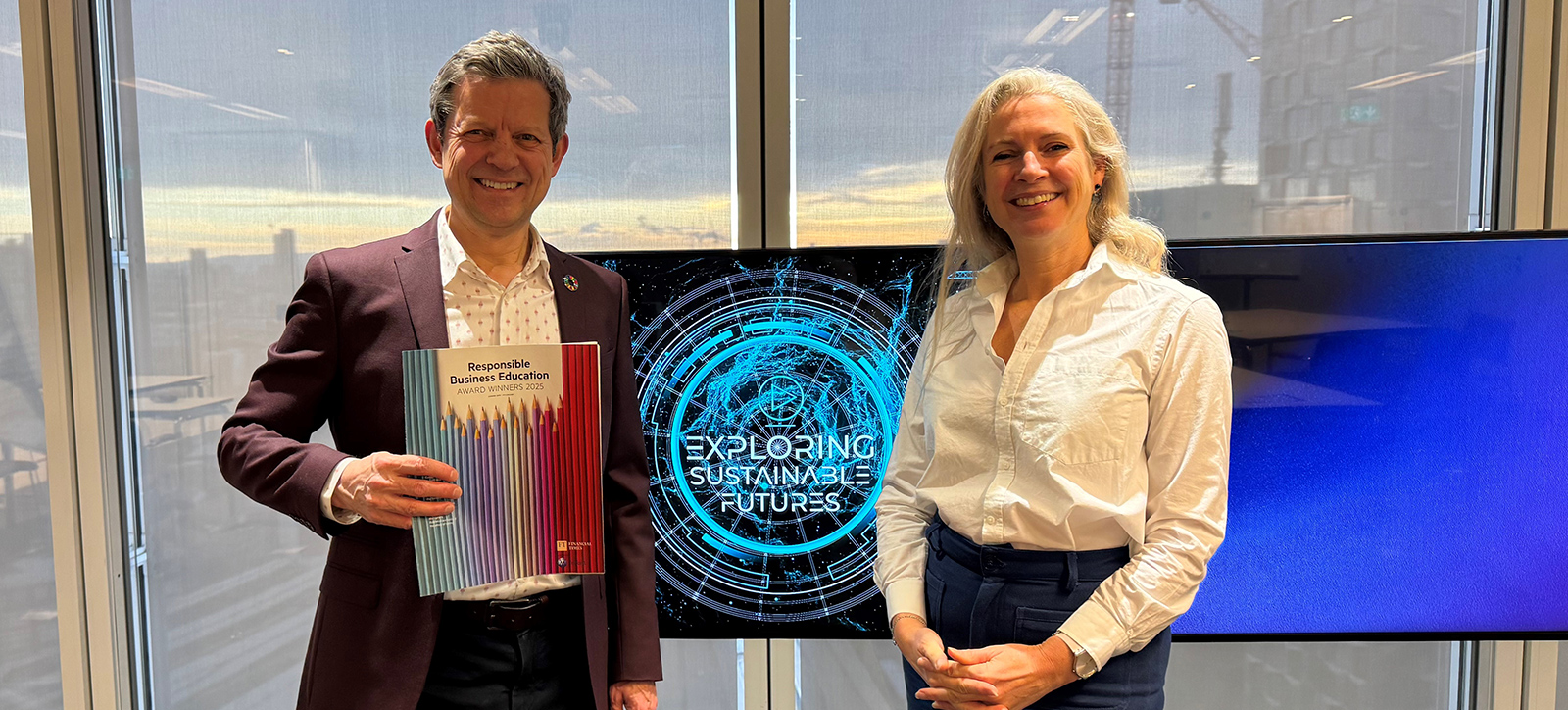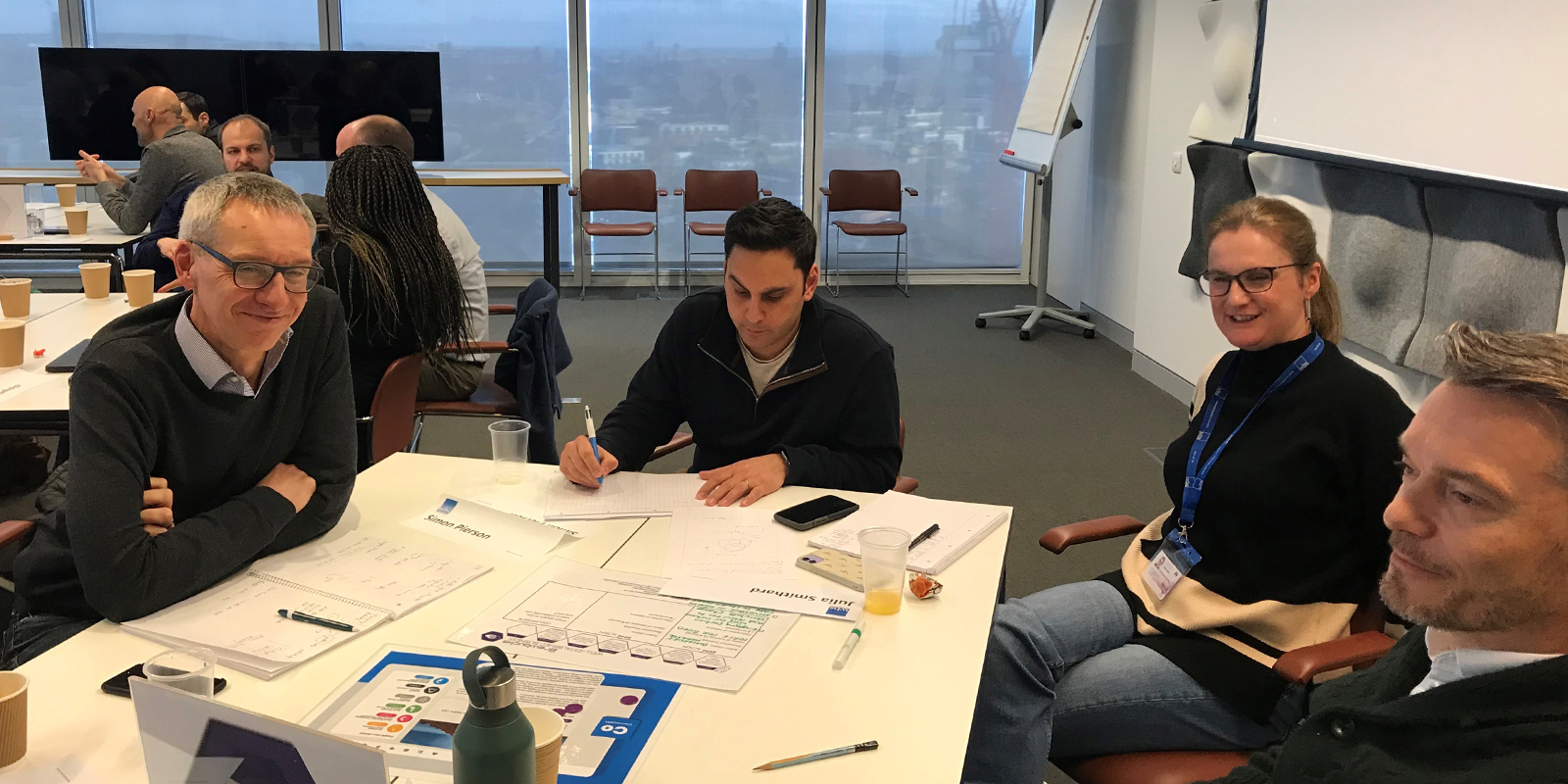
Boardroom games: Hugh Wilson and Rosina Watson celebrate their game's FT award at The Shard
If you could travel through time to 2050 and back, and experience some of the twists and turns of fortune between now and then, could you play your part in shaping a sustainable future for the planet?
That is the question asked by a Warwick Business School academic who was part of the team behind an award-winning business sustainability game.
“What our role-playing game does is show us that we do have agency - that, despite all the climate setbacks we do have the power, and business has the power, to create positive change,” said Hugh Wilson, Professor of Marketing.
First developed in 2018 and showcased at COP26 in Glasgow, the Exploring Sustainable Futures Game was a winner at the 2025 Financial Times Responsible Business Education Awards.
In the game, teams of players ‘time-travel’ forwards to 2050 and experience how alternative futures unfold based on decisions they have made in assumed roles as entrepreneurs, larger companies, civil society organisations, policymakers, and citizen voice groups.
Aimed at students, sustainability practitioners, and business executives, this game-based learning is “underpinned by research on systems thinking and collaborative leadership,” said Professor Wilson, who worked on the project with Dr Rosina Watson, Associate Professor of Sustainability at Cranfield School of Management, and Professor Emma Macdonald of Strathclyde Business School (formerly of WBS), along with sustainability consultant and WBS teaching associate Gemma Adams.
“It’s about seeing businesses, non-profits and other organisations as part of interconnected business ecosystems such as food, clothing, housing, and transport.
“And it’s about seeing how your business cannot flourish over time - even on narrow financial criteria – without being acutely aware of how that ecosystem is evolving to cope with societal and environmental pressures as well as a changing economy.
“So, presented with plausible scenarios of how Europe might change from now to 2050, teams with different values, different starting points and different stakeholders soon discover they have to work together and not just compete if they are to survive, let alone create a world they’d want to live in.
“This is collaboration between different actors in a system.”
Back to the future to improve environmental outcomes
The problem for the game’s participants is precisely because the world keeps changing around them. Invited to ‘fasten their seatbelts’, a video takes players to the world of 2030, including the news headlines from ‘this day’ in 2030.
The players are later shown a glimpse of a 2050 future shaped by their actions before being transported back – in a Back to the Future moment when you can return to the past to change the future – to the news headlines of 2040.
At every point, the players sitting at different tables in organisational groups have to decide what action they will take in response to the events unfolding around them.
“The stories from the future might be about drastic social changes, political turbulence, or environmental upheaval. Some will provoke uncomfortable emotional responses or a questioning of worldview. Others might make a firm’s current business model entirely untenable”, said Professor Wilson.
“So participants have to be open to that emerging future, and what works and what doesn’t work in their ecosystem. They will then need to negotiate to co-create a sustainable future.”

In doing so, he believes that those involved are gaining essential skills. “They are learning to imagine future industry structures, and to position their organisation to succeed within a future structure rather than the current one.
“Along the way, they learn to question their preconceived ideas about the role of business in society, and about what leads to sustained business performance.
“There is also the opportunity, helped by the game’s facilitator, to reflect on the world they have created together.”
Discover sustainability on a Warwick MBA
More than 2,500 people have played the Exploring Sustainable Futures Game since its launch. Cranfield has employed it on a number of its courses, while WBS uses it on its MBA degrees – as well as with faculty as WBS looks at how it, too, can succeed in a sustainable future.
It now features in the Creating Sustainable Organisations module that Professor Wilson teaches on the Executive MBA, Executive MBA (London), Global Online MBA and Global Online MBA (London) programmes.
“One of the highlights of the week was time travelling to 2050 in the Exploring Sustainable Futures game,” said Timothy Machin, UK Finance Director with Assurant and Executive MBA candidate with WBS.
“The game demonstrates the unanticipated consequences of your organisation’s impact on society. After you have travelled to 2030 and 2040, you feel an increased sense of responsibility for how your actions today will shape the world of the future.
“Congratulations to Hugh Wilson, Rosina Watson and the team on winning the Financial Times award.”
Professor Wilson is “utterly delighted” with the Financial Times Responsible Business Education award for the game, which was won in the Best Business School Teaching Materials based on Innovative Research category, and was awarded to project leader Dr Rosina Watson of Cranfield, who is also a teaching associate at WBS.
“Every time I play this game, I am energised by the fact that there are ways forward,” Professor Wilson said.
“The world has come from bad places before and, as a result of collaboration, made sustainability transitions happen – look at the banning of CFCs.
“This game teaches us that we can do it all over again if there is rich and collective interaction between multiple actors.
“I’m very excited about the potential of the game. As far as our collective future is concerned, it’s all to be played for.”
Hugh Wilson is Professor of Marketing, and teaches Creating Sustainable Organisations on the Executive MBA, Executive MBA (London), the Global Online MBA and the Global Online MBA (London). He also teaches Succeeding in a Sustainable Future on the MSc Marketing and Strategy degree.




 X
X Facebook
Facebook LinkedIn
LinkedIn YouTube
YouTube Instagram
Instagram Tiktok
Tiktok